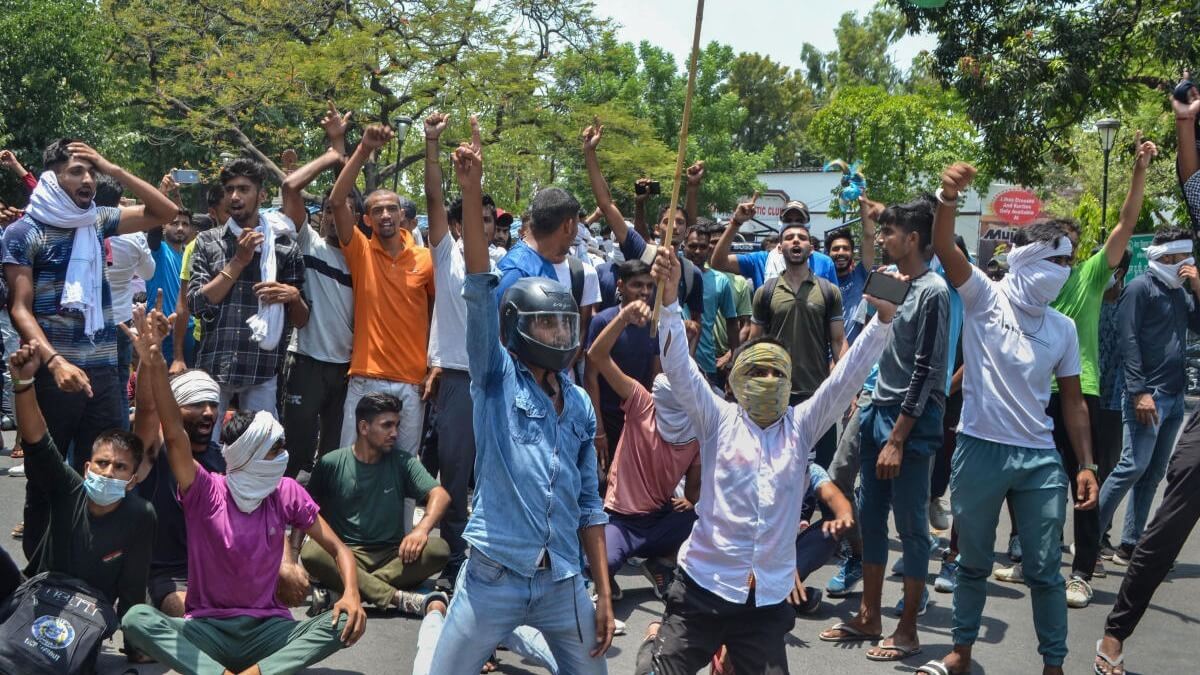India witnessed widespread protests in several states over the government’s decision to introduce radical changes to the Indian Army’s recruitment process, including the lowering of the average age of the armed forces personnel.
Military aspirants, veterans, and opposition members have expressed concern that the reforms will impact the armed forces’ professionalism, ethos, and ability to protect the society. They are thus calling for the scheme to be immediately withdrawn, asserting that the amendments have been rushed due to a two-year halt on recruitment due to the COVID-19 pandemic.
#HimachalPradesh | Protest against the #AgnipathRecruitmentScheme in Dharamshala, before PM Modi's arrival today. pic.twitter.com/LKc8oRbtAR
— NDTV (@ndtv) June 16, 2022
Protests against the “Agnipath” scheme were seen in Bihar, Uttar Pradesh (UP), Haryana, Rajasthan, and Himachal Pradesh, with several demonstrations turning violent.
In Bihar, several angry protestors blocked railway tracks, damaged railway property, and burnt tyres. In Nawada, a ruling party legislator was attacked and a BJP office, resulting in the suspension of internet services in the district.
Similarly, in Gwalior, Madhya Pradesh, a 1000-member mob vandalised the railway station and clashed with police, who retaliated with a lathi charge.
Internet and SMS services were also suspended in certain districts of Haryana and UP due to violent protests.
गृह विभाग ने कानून व्यवस्था को बरकरार रखने व किसी भी तरह की अफवाह को फैलने से रोकने के लिए #पलवल जिला में मोबाइल इंटरनेट, SMS, डोंगल की सेवाएं अस्थाई तौर पर बंद रखने का फैसला लिया है। यह आदेश अगले 24 घंटे तक लागू रहेंगे। जिला में बैंकिंग और मोबाइल रिचार्ज सुविधा जारी रहेगी। pic.twitter.com/irGcLXJ2oz
— DPR Haryana (@DiprHaryana) June 16, 2022
The Agnipath scheme applies to the Army, Navy, and the Air Force. It aims to reduce the average age of armed force personnel and also reduce expenditure on salaries and pensions, which currently accounts for half of the $70.6 billion defence budget. The government said this would allow it to reallocate its budget to modernise the army.
This year, it seeks to recruit about 46,000 “Agniveers,” or young soldiers, between the age of 17 and 21, who will be brought in for four years with a monthly salary of Rs. 30,000 to Rs. 40,000 ($384 to $512). However, recognising that the armed forces could not carry on recruitments over the past two years, the age limit for 2022 recruits has been raised to 23.
Beyond the four-year period of the Agnipath programme, 25% of recruits will be inducted into the regular cadre for 15 years.
#WATCH | Youth hold protest in Jehanabad over the recently announced #AgnipathRecruitmentScheme for Armed forces. Rail and road traffic disrupted by the protesting students. pic.twitter.com/iZFGUFkoOU
— ANI (@ANI) June 16, 2022
The remaining 75% will exit the forces and will receive the “Seva Nidhi” package worth Rs. 1.71 million ($21,920). According to the scheme, they will be “infused into civil society, where they can contribute immensely towards the nation building process.” However, unlike other retired armed force personnel, they will not receive any pension or gratuity.
Before the introduction of the scheme, all armed force personnel were inducted for a lifetime or a 17-year period, depending on their position.
Defence Minister Rajnath Singh backed the scheme, saying that it would help bring in younger members into the armed forces and bring down the average age from 31 to 24-26. He further said that it would help the forces become more modern, tech-savvy, and well-equipped.
India's Youth is opposing #AgnipathRecruitmentScheme & their demands are justified
— AAP (@AamAadmiParty) June 16, 2022
CM @ArvindKejriwal appeals to PM Modi:
1⃣Allow them to serve in the Army for their whole life, NOT just 4 years
2⃣Give a chance to those who're overage due to lack of recruitment in last 2 years pic.twitter.com/MkqyTI2CCV
Echoing Singh’s support for the scheme, Lieutenant General BS Raju said it will help achieve a balance between young and experienced fighters. Other Army personnel, too, said it would allow for modernisation of the armed forces, noting that it is difficult to train older members.
However, critics of the scheme say it would result in the “militarisation of the society,” as over 35,000 young, trained officers will be rendered jobless each year. Furthermore, 75% of those recruited under the scheme will also be made to look for alternate careers after four years. They argue that this will worsen the unemployment rate, which already stands at 7.83%.
#अग्निपथ_योजना
— Ministry of Information and Broadcasting (@MIB_India) June 16, 2022
❌Myth V/s Facts✅
भ्रम-6: रेजिमेंटल बॉन्डिंग पर असर पड़ेगा?
सच्चाई👇 pic.twitter.com/tiiZKl34ip
To this end, the government said in its “myths vs facts” release that those seeking to go for further studies will be given a 12-class equivalent certificate. Moreover, those seeking salaried jobs will be given priority in the Central Armed Police Forces and state police, adding that avenues will be opened up in other sectors too.
The Indian government further clarified that such short-term recruitment schemes exist in several countries and are a tried and tested practice. The release stated that it had looked at several countries—including Israel, United States, China, France, Russia, the United Kingdom, and Germany—and modified their policies to adopt it to Indian society.

